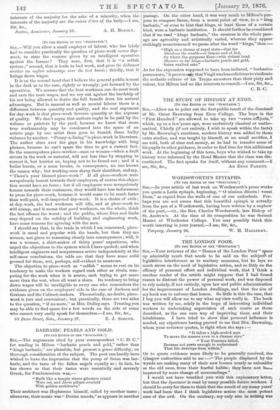BARBARIC PEARLS AND GOLD.
(TO THE EDITOR OF THE "SPECIAT0R.1
Sin,—The arguments cited by your correspondent "C. 1). C." for reading in Milton "barbaric pearls and gold," rather than "kings barbaric," are plausible, but present a grave difficulty, on thorough consideration of the subject. The poet can hardly have wished to leave the impression that the pomp of Satan was bar- baric, and the taste of the fallen angels equally so ; in fact, he has shown us that their tastes were essentially and severely Greek, for Pandemonium was,—
" Built like a temple where pilasters round Were set, and Doric pillars overlaid With golden architrave."
Their architect was Hepluestus himself, called by another name ; =layover, their music was" Dorian moods," as appears in another passage. On the other hand, it was very much to Milton's pur- pose to compare Satan, from a moral point -of view, to a "king barbaric," or even to hint that kings, at least those of a certain kind, were a barbaric institution. It should further he considered that if we read "kings barbaric," the ca3suras in the whole pass- age are agreeably and artistically varied, whereas they appear strikingly monotonous if we pause after the word "kings," thus
"High on a throne of royal state—that far Outshone the wealth—of Ormus and of Ind, Or where the gorgeous East—with richest hand Showers on her kings—barbaric pearls and gold, Satan exalted sate."
As for the expression supposed to have been imitated, " barbarico postes auro," it proves only that Virgil was less solicitous to vindicate- the msthetic culture of his Trojan ancestors than their piety and valour, but Milton had no like interests to consult.—! am, Sir, &c.,.
C. B. C.






































 Previous page
Previous page